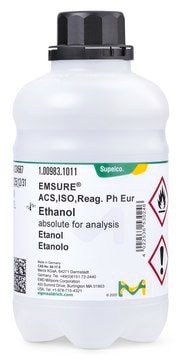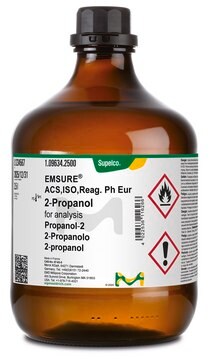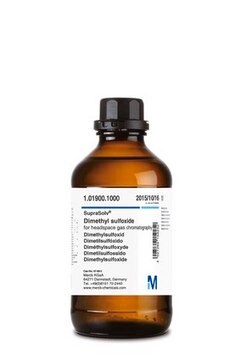328634
1-Methyl-2-pyrrolidinone
anhydrous, 99.5%
Synonym(s):
1-Methyl-2-pyrrolidone, N-Methyl-2-pyrrolidone, NMP
About This Item
Recommended Products
grade
anhydrous
Quality Level
vapor density
3.4 (vs air)
vapor pressure
0.29 mmHg ( 20 °C)
0.99 mmHg ( 40 °C)
Assay
99.5%
form
liquid
autoignition temp.
518 °F
expl. lim.
9.5 %
impurities
<0.005% water
refractive index
n20/D 1.47 (lit.)
pH
7.7-10.0 (20 °C, 100 g/L)
bp
202 °C (lit.)
81-82 °C/10 mmHg (lit.)
mp
−24 °C (lit.)
density
1.028 g/mL at 25 °C (lit.)
SMILES string
CN1CCCC1=O
InChI
1S/C5H9NO/c1-6-4-2-3-5(6)7/h2-4H2,1H3
InChI key
SECXISVLQFMRJM-UHFFFAOYSA-N
Looking for similar products? Visit Product Comparison Guide
Related Categories
Application
- Preparation of 2-aryl and 2-alkyl benzothiazoles.
- Ullmann coupling reaction of aryl halides and phenols to form Ullmann ethers in the presence of 2,2,6,6-tetramethylheptane-3,5-dione.
- Stille cross-coupling reaction of aryl iodides with organostannanes catalyzed by Pd/C in the presence of copper iodide as cocatalyst.
Packaging
Other Notes
Legal Information
also commonly purchased with this product
recommended
suggested gloves for splash protection
Signal Word
Danger
Hazard Statements
Precautionary Statements
Hazard Classifications
Eye Irrit. 2 - Repr. 1B - Skin Irrit. 2 - STOT SE 3
Target Organs
Respiratory system
Storage Class Code
6.1C - Combustible, acute toxic Cat.3 / toxic compounds or compounds which causing chronic effects
WGK
WGK 1
Flash Point(F)
195.8 °F - Pensky-Martens closed cup
Flash Point(C)
91 °C - Pensky-Martens closed cup
Personal Protective Equipment
Regulatory Listings
Regulatory Listings are mainly provided for chemical products. Only limited information can be provided here for non-chemical products. No entry means none of the components are listed. It is the user’s obligation to ensure the safe and legal use of the product.
EU REACH SVHC Candidate List
EU REACH Annex XVII (Restriction List)
Choose from one of the most recent versions:
Already Own This Product?
Find documentation for the products that you have recently purchased in the Document Library.
Articles
Amide bonds are ubiquitous in both nature and industrial applications. They are vital to the structure and function of biological macromolecules and polymers. The importance of this functionality has resulted in numerous approaches to its formation, ranging from stoichiometric activation of carboxylic acids to more recent advances in catalytic amide bond formation.
Our team of scientists has experience in all areas of research including Life Science, Material Science, Chemical Synthesis, Chromatography, Analytical and many others.
Contact Technical Service





